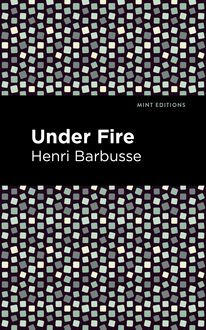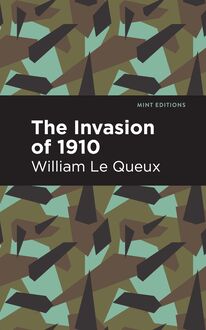-
 Univers
Univers
-
 Ebooks
Ebooks
-
 Livres audio
Livres audio
-
 Presse
Presse
-
 Podcasts
Podcasts
-
 BD
BD
-
 Documents
Documents
-
- Cours
- Révisions
- Ressources pédagogiques
- Sciences de l’éducation
- Manuels scolaires
- Langues
- Travaux de classe
- Annales de BEP
- Etudes supérieures
- Maternelle et primaire
- Fiches de lecture
- Orientation scolaire
- Méthodologie
- Corrigés de devoir
- Annales d’examens et concours
- Annales du bac
- Annales du brevet
- Rapports de stage
La lecture à portée de main
Vous pourrez modifier la taille du texte de cet ouvrage
Découvre YouScribe en t'inscrivant gratuitement
Je m'inscrisDécouvre YouScribe en t'inscrivant gratuitement
Je m'inscrisEn savoir plus
Vous pourrez modifier la taille du texte de cet ouvrage
En savoir plus

Description
As tension begins to grow in America during the revolution, Mr. Wharton, a British sympathizer, moves his family to his county estate named “The Locusts,” with the intention to avoid any political conflict. Located in Westchester County, New York, the area was considered a common ground for patriots and loyalists. However, action starts to stir in the neutral town when an enigmatic man shows up at Mr. Wharton’s home. Hoping for shelter from the severe storm looming over the area, Mr. Harper, a man who holds himself like a soldier, but dresses in plain clothes, asks Mr. Wharton if he could harbor himself at The Locusts. Mr. Wharton agrees, immediately attempting to root out Harper’s feelings about the revolution. Harper, however, stays unresponsive to his efforts. The mystery continues when Harper meets with a peddler named Harvey Birch. When a servant in Mr. Wharton’s home overhears part of their conversation, he immediately tells Mr. Wharton about what he perceived as suspicious behavior. As rumors spread about their meetings and political preferences, a theory that Birch is a spy for the British becomes popular. When a bounty is placed over Birch’s head, he must evade capture, attack, and espionage as he struggles to protect his secret.
Written with beautiful simplicity, The Spy by James Fenimore Cooper was inspired by a real event during the American Revolution. Originally published in 1821, The Spy served as one of the first literary works to portray an American setting, instead of the traditional English practice to depict European settings. This innovation appealed to James Fenimore Cooper’s intention to eliminate the bias against Americans, and to foster a proud culture by depicting the American landscape with intricate detail. With the depiction of major revolutionary figures, the early environment of small-town America, and an examination of the revolution’s effect on culture, The Spy by James Fenimore Cooper is a complex and comprehensive narrative.
This edition of James Fenimore Cooper’s The Spy has been redesigned to accommodate the modern reader. With a striking new cover, and printed in a stylish font, The Spy is an accessible and essential read for any American patriot.
Sujets
Informations
| Publié par | Mint Editions |
| Date de parution | 05 janvier 2021 |
| Nombre de lectures | 0 |
| EAN13 | 9781513274492 |
| Langue | English |
Informations légales : prix de location à la page 0,0500€. Cette information est donnée uniquement à titre indicatif conformément à la législation en vigueur.
Extrait
The Spy
James Fenimore Cooper
The Spy was first published in 1821.
This edition published by Mint Editions 2021.
ISBN 9781513269498 | E-ISBN 9781513274492
Published by Mint Editions®
minteditionbooks.com
Publishing Director: Jennifer Newens
Design & Production: Rachel Lopez Metzger
Typesetting: Westchester Publishing Services
C ONTENTS I II III IV V VI VII VIII IX X XI XII XIII XIV XV XVI XVII XVIII XIX XX XXI XXII XXIII XXIV XXV XXVI XXVII XXVIII XXIX XXX XXXI XXXII XXXIII XXXIV XXXV
I
And though amidst the calm of thought entire,
Some high and haughty features might betray
A soul impetuous once—’twas earthly fire
That fled composure’s intellectual ray,
As Etna’s fires grow dim before the rising day.
— Gertrude of Wyoming
I t was near the close of the year 1780 that a solitary traveler was seen pursuing his way through one of the numerous little valleys of Westchester. 1 The easterly wind, with its chilling dampness and increasing violence, gave unerring notice of the approach of a storm, which, as usual, might be expected to continue for several days; and the experienced eye of the traveler was turned in vain, through the darkness of the evening, in quest of some convenient shelter, in which, for the term of his confinement by the rain that already began to mix with the atmosphere in a thick mist, he might obtain such accommodations as his purposes required. Nothing whatever offered but the small and inconvenient tenements of the lower order of the inhabitants, with whom, in that immediate neighborhood, he did not think it either safe or politic to trust himself.
The county of Westchester, after the British had obtained possession of the island of New York, 2 became common ground, in which both parties continued to act for the remainder of the war of the Revolution. A large proportion of its inhabitants, either restrained by their attachments, or influenced by their fears, affected a neutrality they did not feel. The lower towns were, of course, more particularly under the dominion of the crown, while the upper, finding a security from the vicinity of the continental troops, were bold in asserting their revolutionary opinions, and their right to govern themselves. Great numbers, however, wore masks, which even to this day have not been thrown aside; and many an individual has gone down to the tomb, stigmatized as a foe to the rights of his countrymen, while, in secret, he has been the useful agent of the leaders of the Revolution; and, on the other hand, could the hidden repositories of divers flaming patriots have been opened to the light of day, royal protections would have been discovered concealed under piles of British gold.
At the sound of the tread of the noble horse ridden by the traveler, the mistress of the farmhouse he was passing at the time might be seen cautiously opening the door of the building to examine the stranger; and perhaps, with an averted face communicating the result of her observations to her husband, who, in the rear of the building, was prepared to seek, if necessary, his ordinary place of concealment in the adjacent woods. The valley was situated about midway in the length of the county, and was sufficiently near to both armies to make the restitution of stolen goods no uncommon occurrence in that vicinity. It is true, the same articles were not always regained; but a summary substitute was generally resorted to, in the absence of legal justice, which restored to the loser the amount of his loss, and frequently with no inconsiderable addition for the temporary use of his property. In short, the law was momentarily extinct in that particular district, and justice was administered subject to the bias of personal interests and the passions of the strongest.
The passage of a stranger, with an appearance of somewhat doubtful character, and mounted on an animal which, although unfurnished with any of the ordinary trappings of war, partook largely of the bold and upright carriage that distinguished his rider, gave rise to many surmises among the gazing inmates of the different habitations; and in some instances, where conscience was more than ordinarily awake, to no little alarm.
Tired with the exercise of a day of unusual fatigue, and anxious to obtain a speedy shelter from the increasing violence of the storm, that now began to change its character to large drops of driving rain, the traveler determined, as a matter of necessity, to make an application for admission to the next dwelling that offered. An opportunity was not long wanting; and, riding through a pair of neglected bars, he knocked loudly at the outer door of a building of a very humble exterior, without quitting his saddle. A female of middle age, with an outward bearing but little more prepossessing than that of her dwelling, appeared to answer the summons. The startled woman half closed her door again in affright, as she saw, by the glare of a large wood fire, a mounted man so unexpectedly near its threshold; and an expression of terror mingled with her natural curiosity, as she required his pleasure.
Although the door was too nearly closed to admit of a minute scrutiny of the accommodations within, enough had been seen to cause the horseman to endeavor, once more, to penetrate the gloom, with longing eyes, in search of a more promising roof, before, with an ill-concealed reluctance, he stated his necessities and wishes. His request was listened to with evident unwillingness, and, while yet unfinished, it was eagerly interrupted by the reply:
“I can’t say I like to give lodgings to a stranger in these ticklish times,” said the female, in a pert, sharp key. “I’m nothing but a forlorn lone body; or, what’s the same thing, there’s nobody but the old gentleman at home; but a half mile farther up the road is a house where you can get entertainment, and that for nothing. I am suret ’will be much convenienter to them, and more agreeable to me—because, as I said before, Harvey is away; I wish he’d take advice, and leave off wandering; he’s well to do in the world by this time; and he ought to leave off his uncertain courses, and settle himself, handsomely, in life, like other men of his years and property. But Harvey Birch will have his own way, and die vagabond after all!”
The horseman did not wait to hear more than the advice to pursue his course up the road; but he had slowly turned his horse towards the bars, and was gathering the folds of an ample cloak around his manly form, preparatory to facing the storm again, when something in the speech of the female suddenly arrested the movement.
“Is this, then, the dwelling of Harvey Birch?” he inquired, in an involuntary manner, apparently checking himself, as he was about to utter more.
“Why, one can hardly say it is his dwelling,” replied the other, drawing a hurried breath, like one eager to answer; “he is never in it, or so seldom, that I hardly remember his face, when he does think it worth his while to show it to his poor old father and me. But it matters little to me, I’m sure, if he ever comes back again, or not;—turn in the first gate on your left;—no, I care but little, for my part, whether Harvey ever shows his face again or not—not I”—and she closed the door abruptly on the horseman, who gladly extended his ride a half mile farther, to obtain lodgings which promised both more comfort and greater security.
Sufficient light yet remained to enable the traveler to distinguish the improvements 3 which had been made in the cultivation, and in the general appearance of the grounds around the building to which he was now approaching. The house was of stone, long, low, and with a small wing at each extremity. A piazza, extending along the front, with neatly turned pillars of wood, together with the good order and preservation of the fences and outbuildings, gave the place an air altogether superior to the common farmhouses of the country. After leading his horse behind an angle of the wall, where it was in some degree protected from the wind and rain, the traveler threw his valise over his arm, and knocked loudly at the entrance of the building for admission. An aged black soon appeared; and without seeming to think it necessary, under the circumstances, to consult his superiors,—first taking one prying look at the applicant, by the light of the candle in his hand,—he acceded to the request for accommodations. The traveler was shown into an extremely neat parlor, where a fire had been lighted to cheer the dullness of an easterly storm and an October evening. After giving the valise into the keeping of his civil attendant, and politely repeating his request to the old gentleman, who arose to receive him, and paying his compliments to the three ladies who were seated at work with their needles, the stranger commenced laying aside some of the outer garments which he had worn in his ride.
On taking an extra handkerchief from his neck, and removing a cloak of blue cloth, with a surtout of the same material, he exhibited to the scrutiny of the observant family party, a tall and extremely graceful person, of apparently fifty years of age. His countenance evinced a settled composure and dignity; his nose was straight, and approaching to Grecian; his eye, of a gray color, was quiet, thoughtful, and rather melancholy; the mouth and lower part of his face being expressive of decision and much character. His dress, being suited to the road, was simple and plain, but such as was worn by the higher class of his countrymen; he wore his own hair, dressed in a manner that gave a military air to his appearance, and which was rather heightened by his erect and conspicuously graceful carriage. His whole appearance was so impressive and so decidedly that of a gentleman, that as he finished laying aside the garments, the ladies arose from their seats, and, together with the master of the house, they received anew, and returned the complimen
-
 Univers
Univers
-
 Ebooks
Ebooks
-
 Livres audio
Livres audio
-
 Presse
Presse
-
 Podcasts
Podcasts
-
 BD
BD
-
 Documents
Documents
-
Jeunesse
-
Littérature
-
Ressources professionnelles
-
Santé et bien-être
-
Savoirs
-
Education
-
Loisirs et hobbies
-
Art, musique et cinéma
-
Actualité et débat de société
-
Jeunesse
-
Littérature
-
Ressources professionnelles
-
Santé et bien-être
-
Savoirs
-
Education
-
Loisirs et hobbies
-
Art, musique et cinéma
-
Actualité et débat de société
-
Actualités
-
Lifestyle
-
Presse jeunesse
-
Presse professionnelle
-
Pratique
-
Presse sportive
-
Presse internationale
-
Culture & Médias
-
Action et Aventures
-
Science-fiction et Fantasy
-
Société
-
Jeunesse
-
Littérature
-
Ressources professionnelles
-
Santé et bien-être
-
Savoirs
-
Education
-
Loisirs et hobbies
-
Art, musique et cinéma
-
Actualité et débat de société
- Cours
- Révisions
- Ressources pédagogiques
- Sciences de l’éducation
- Manuels scolaires
- Langues
- Travaux de classe
- Annales de BEP
- Etudes supérieures
- Maternelle et primaire
- Fiches de lecture
- Orientation scolaire
- Méthodologie
- Corrigés de devoir
- Annales d’examens et concours
- Annales du bac
- Annales du brevet
- Rapports de stage










